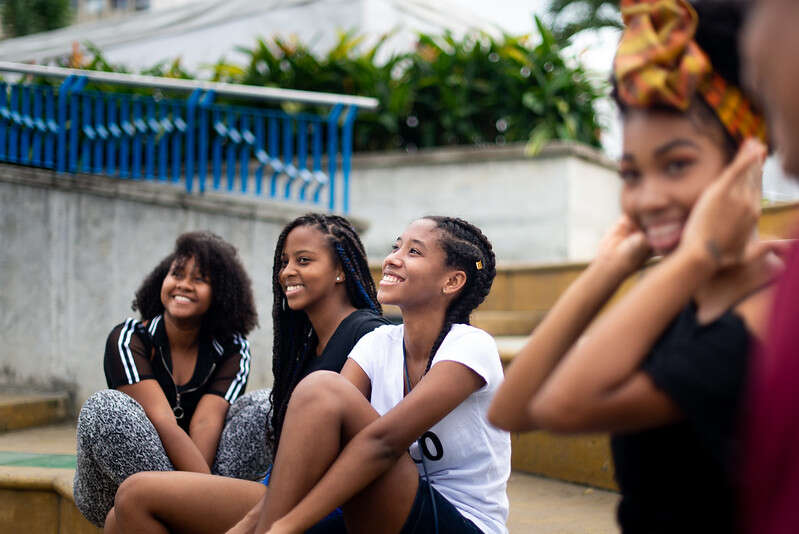
The pull of large urban areas has resulted in more people settling and bringing up children in cities – meaning that now 60% of rapidly growing city populations are projected to be less than 18 years old by 2030.

While cities are places of opportunity and growth, from education to healthcare, to employment, our city systems are currently failing young people with increased exclusion and poverty in disadvantaged urban areas, damaging their health and well-being, and leaving them at risk of being left behind.
The good news is that we have a strong opportunity to reimagine the way we approach our cities. New technological solutions and civic innovation could allow us to tackle health, social and economic challenges at a level of scale, accessibility and inclusivity we have never been able to achieve before.
However, we will only achieve this success if we include young people’s voices and opinions in decision-making and transformative processes. Young people are powerful agents of change, and as the share of young people living in cities increases around the world, it would be a disservice not to allow young people a seat at the table when it comes to urban governance.
City matters: The health and well-being of the young
Fondation Botnar exists to improve the health and well-being of young people living in cities around the world, by supporting their active involvement to build sustainable and inclusive cities. We do this by promoting urban environments and systems that are truly fit and ready to support the young people who live in them. Our flagship program – OurCity – aims to drive change by including young people in intermediary cities as equal partners at every stage by focusing on their needs.
At present, OurCity has been launched in four selected cities around the world, with an aim to implement coordinated programmes that leverage local strengths, community engagement and digital technologies to transform cities and ensure young people’s well-being. As part of the initiative, young people, civil society, policymakers, innovators, and other city champions collaborate to transform cities and ensure an enabling environment for young people’s participation.
Launched in Tanga, Tanzania, in 2018 and Cluj-Napoca, Romania, in 2020, the programme has gone from strength to strength. In both cities, our talented partners have achieved success in collaboration with local stakeholders and youth. For example, through a collaborative process with the Tanga city council, local youth and other stakeholders, we have supported the creation of the first STEM Park in East Africa, led by ProjektInspire, the development of a digital city observatory platform to improve the use of data in decision-making processes, led by Tanzania Data Lab and the Ardhi University, as well as other projects to improve learning environments in schools, entrepreneurship, digital literacy and life skills training.
In Cluj-Napoca, the programme has seen similar success through the development of projects related to nutrition and healthy lifestyle in schools, school dropout prevention, youth participation through arts and comics, and a social innovation incubator for young people.
Supporting cities’ young
Since its inception, OurCity has supported various projects that have involved and positively impacted Tanga and Cluj-Napoca’s youth. They have improved learning environments, strengthened innovation systems by enabling creative entrepreneurship initiatives to flourish, provided safer spaces for children near schools, helped students enhance their digital skills, and more. These projects have created and fostered opportunities for young people to develop skills so they can thrive and continue to contribute to their communities.
We are excited to have now expanded the initiative to Latin America, one of the world’s most highly urbanised regions. The cities of Manta in Ecuador and Barranquilla in Colombia have been selected to join OurCity for a ten-year partnership. Both cities have a young leadership that is open to collaboration, positive economic environments, and city governance that understands the value of cross-generational collaboration. During the next ten years, stakeholders within Manta and Barranquilla will engage in a cross-sector collaboration process, and design activities to suit the unique needs of each city. We are looking forward to learning from the young people within both cities and supporting the developments they want to see within their communities.
As early successes are emerging from the OurCity initiative, its model of collaboration with different stakeholders can be used as a blueprint for how to involve young people in governance processes. However, it takes more than a few years to see and achieve long-lasting changes that enhance young people’s well-being and opportunities. We will need to continue monitoring our activities to evaluate to what extent they help foster change and how they can be improved.
Today, on World Cities Day, there is no better time to have a conversation on the need to include young people in the decision-making and normative processes for urban development. It is only with their involvement, that we can develop cities that are safe and ready to meet the needs of young people around the world – supporting them to thrive and prosper, as well as unlocking the vast potential for generations to come.
[Read more: 60 years later, Dallas seeks to right a past wrong]






